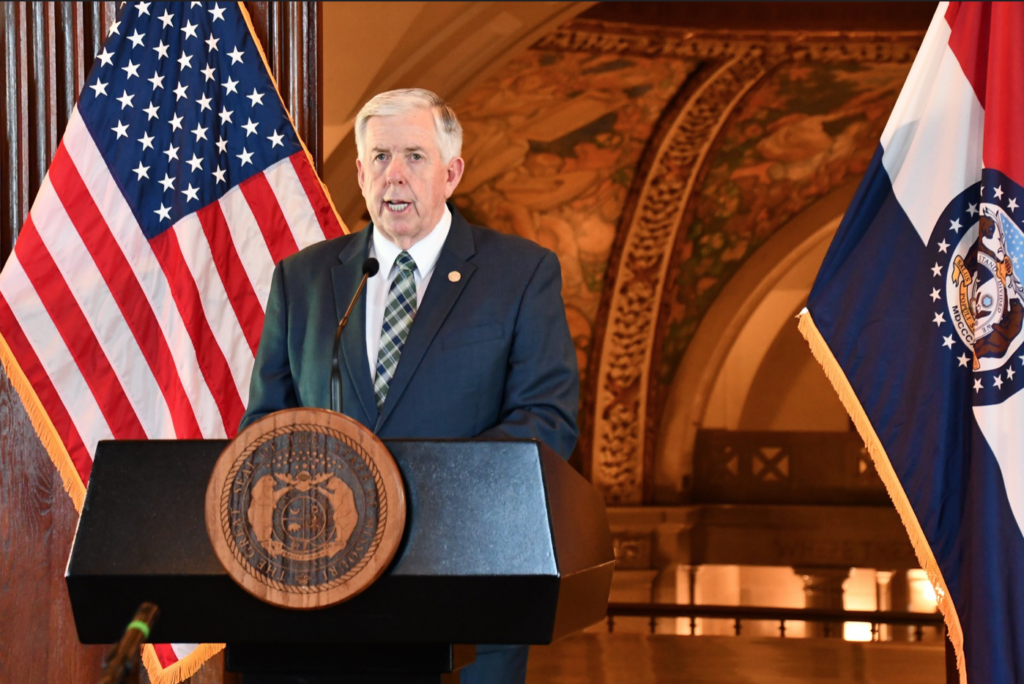Missouri governor signs bill protecting business, health care, religious organizations from COVID-19 lawsuits

Missouri Gov. Mike Parson highlighted on Wednesday a manufacturer’s altruism and innovation in producing about 20,000 face shields before signing COVID-19 liability legislation into law.
“This is what working together is all about,” Parson said at Koller-Craft Plastic Products in Fenton. “No one should be punished by trying to save the lives of other people. That’s why COVID liability is so important, so people cannot come in here and sue a business like this.”
Parson ceremonially signed Senate Bill 51 to provide liability protection for businesses, health care providers and religious organizations from COVID-related lawsuits.
Al Koller, president of Koller Enterprises and chairman of the Missouri Chamber of Commerce board of directors, said his company was able to use its resources to produce thousands of face shields at the start of the pandemic when personal protective equipment was in short supply. His relationship with the Missouri Chamber provided a distribution channel to rural areas of the state.
“This helped us get the shields to health care workers and first responders everywhere when there were concerns of the supplies going to the cities,” Koller said. “And how do you price something like this? It was easier to donate and we just sent them out.”
Matthew Panik, vice president of governmental affairs at the Missouri Chamber, said most of his organization’s efforts for legislative initiatives result in 30 to 50 businesses signing a letter of support. The COVID liability legislation resulted in 800 businesses signing on.
“This legislation will help businesses, manufacturers and health care providers by protecting them from frivolous COVID-19 lawsuits,” Panik said. “It will give these businesses and groups the stability they need to get the economy running again.”
Several organizations lobbied against the legislation, including the Missouri Association of Trial Attorneys (MATA), the American Association of Retired Persons of Missouri, the AFL-CIO, and VOYCE, a long-term care ombudsman program.
“The bill will block Missourians’ access to justice by taking away their right to hold wrongdoers accountable in cases that aren’t strictly related to COVID because the language is written so broadly,” MATA wrote in opposition to the bill.
During floor debate before the bill passed on the last day of the session, legislators stated concerns about not being able to hold nursing homes accountable for neglect during the pandemic.
“Judicial recourse is the only remaining avenue for protecting residents and holding nursing homes accountable for substandard care,” wrote Nicole Lynch, the public policy coordinator for VOYCE, in a letter opposing the bill.
Parson said facilities caring for the elderly or vulnerable will continue to be held accountable.
“We looked at nursing homes and veterans home and we don’t want to give anybody a free pass if they’re doing something wrong,” Parson said. “This bill doesn’t do that. If there’s neglect or you’re not doing your job, you’re still going to be responsible for that. Here in this company, somebody stepped up and tried to make a face shield. All of a sudden we might find out something didn’t work with it. But at the time, they were doing their best to give people something, because we didn’t have anything. People were making masks and gowns from home.”
MATA specifically mentioned in its legislative correspondence how first responders and health care workers would be at greater risk without legal recourse for poor-quality masks and face shields.
“I think the key is to see if you’re trying to do the right thing, if you’re following the guidelines, and if you’re following the laws,” Koller said. “I know there are no absolutes. But during this pandemic, everyone was just trying to figure out what’s the best way to do things. And there were a lot of different ways.”
The law will expire in 2025.
This article was originally posted on Missouri governor signs bill protecting business, health care, religious organizations from COVID-19 lawsuits






